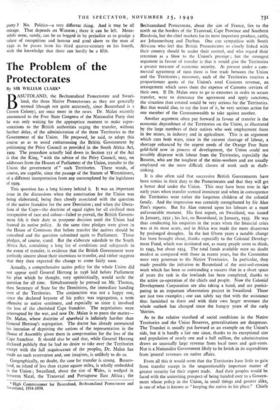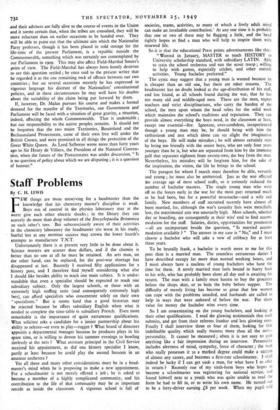The Problem of the Protectorates
By SIR WILLIAM CLARK*
BASUTOLAND, the Bechuanaland Protectorate and Swazi- land, the three Native Protectorates as they are generally termed (though not quite accurately, since Basutoland is a Crown Colony), are once more in the news. Dr. Malan recently announced to the Free State Congress of the Nationalist Party that
he was only waiting for the appropriate moment to make repre- sentations to the British authorities urging the transfer, without further delay, of the administration of the three Territories to the Government of the Union. He proposed, he said, to adopt this course so as to avoid embarrassing the British Government by petitioning the Privy Council as provided in the South Africa Act, 1909. The procedure actually laid down in. Section 151 of the Act is that the King, "with the advice of the Privy Council, may, on addresses from the Houses of Parliament of the Union, transfer to the Union the government of" such Territories. These words, of course, are capable, since the passage of the Statute of Westminster, of a different interpretation from any contemplated by the legislators of 1909.
This question has a long history behind it. It was an important issue in the discussions when the constitution for the Union was being elaborated, being then closely associated with the question of the native franchise for the new Dominion ; and when the libera- lism of the Cape—the doctrine of equal rights for all civilised men irrespective of race and colour—failed to prevail, the British Govern- ment felt it their duty to postpone decision until the Union had framed its native policy. At the same time pledges were given in the House of Commons that before transfer the natives should be consulted and the question submitted again to Parliament. Those pledges, of course, stand. But the elaborate schedule to the South Africa Act, containing a long list of conditions and safeguards in the event of transfer, is evidence that the British Government were perfectly sincere about their intentions to transfer, and rather suggests that they then expected the change to come fairly soon.
Actually, a comprehensive native policy for the whole Union did not appear until General Hertzog in 1936 laid before Parliament his plan which he thought, very optimistically, would settle the question for all time. Simultaneously he pressed on Mr. Thomas, then Secretary of State for the Dominions, the immediate handing over of the Territories. The conjunction was not a happy one, since the declared keynote of his policy was segregation, a term offensive to native sentiment, and especially so since it involved the loss of the cherished Cape franchise. The negotiations were interrupted by the war, and now Dr. Malan is to press the matter— Dr. Malan, whose doctrine of apartheid is infinitely harsher than General Hertzog's segregation. The doctor has already announced his intention of depriving the natives of the representation in the House of Assembly given them in compensation for the loss of the Cape franchise. It should also be said that, while General Hertzog declared publicly that he had no desire to take over the Territories except with the full acquiescence of the peoples, Dr. Malan has made no such reservation and, one imagines, is unlikely to do so.
Geographically, no doubt, the case for transfer is strong. Basuto- land, an island of less than 12,000 square miles, is wholly embedded in the Union ; Swaziland, about the size of Wales, is wedged in between Natal, the Transvaal and Portuguese East Africa ; the * High Commissioner for Basutoland, Bechuanaland Protectorate and Swaziland, 1934-1939. Bechuanaland Protectorate, about the size of France, lies to the north on the borders of the Transvaal, Cape Province and Southern Rhodesia, but the chief markets for its most important produce, cattle, are Johannesburg and Durban. One can sympathise with South Africans who feel that British Protectorates so closely linked with their country should be under their control, and who regard their retention as a blow to the Union's prestige ; but the strongest argument in favour of transfer is that it would give the Territories a greater measure of economic security. At present under a com- mercial agreement of 1910 there is free trade between the Union and the Territories ; moreover, each of the Territories receives a proportionate quota of the Union's total Customs revenue, an arrangement which saves them the expense of Customs services of their own. If Dr. Malan were to go to extremes in order to secure transfer, were to denounce the agreement and apply sanctions, the situation thus created would be very serious for the Territories. But that would also, to say the least of it, be very serious action for one member of the Commonwealth to take against another.
Another argument often put forward in favour of transfer is the economic dependence of the Territories on the Union, as illustrated by the large numbers of their natives who seek employment there in the mines, in industry and in agriculture. This is an argument which cuts both ways, since in the current shortage of labour, a shortage enhanced by the urgent needs of the Orange Free State gold-field now in process of development, the Union could not possibly dispense with labour from the Territories, especially the Basutos, who are the toughest of the mine-workers and are usually employed on the more difficult classes of work such as shaft- sinking.
It is also often said that successive British Governments have been remiss in their duty to the Protectorates and that they will get a better deal under the Union. This may have been true in dae early years when transfer seemed imminent and when in consequence the Territories were rather the forgotten children of the colonial family. And the impression was certainly strengthened by Sir Alan Pim's reports. But Sir Alan entered upon his labours at a most unfavourable moment. His first report, on Swaziland, was issued in January, 1932; his last, on Basutoland, in January, 5935. He was thus conducting his enquiries in the years when the financial crisis was at its most acute, and in Africa was made the more disastrous by prolonged droughts. In the last fifteen years a notable change has been brought about, thanks especially to the Colonial Develop- ment Fund, which was instituted not, as many people seem to think, in 1945, but about 1934. The total funds available were no doubt modest as compared with those in recent years, but the Committee were very generous to the Native Territories. In particular, they made possible the initiation in Basutoland of the anti-soil-erosion work which has been so outstanding a success that in a short space of years the task in the lowlands has been completed, thanks to the active co-operation of the chiefs and people. Now the Colonial Development Corporation are also taking a hand, and are partici- pating in an important afforestation project in Swaziland. These are just two examples ; one can safely say that with the assistance thus furnished to them and with their own larger revenues the whole outlook has changed since the hungry years of the early 'thirties.
As to the relative standard of social conditions in the Native Territories and the Union Reserves, generalisations are dangerous. The Transkei is usually put forward as an example on the Union's side, but it is hardly a fair one since, thanks to its exceptional size and population of nearly one and a half million, the administration draws an unusually large revenue from local taxes and quit-rents. Nor is a Nationalist Government likely to be lavish in its expenditure from general revenues on native affairs.
From all this it would seem that the Territories have little to gain from transfer except in the unquestionably important matter of greater security for their export trade. And their peoples would be faced with the uninviting prospect of being handed over to a Govern- ment whose policy in the Union, in small things and greater alike, is one of what is known as "keeping the native in his place." Chiefs and their advisers are fully alive to the course of events in the Union and it seems certain that, when the tribes are consulted, they will be more reluctant than on earlier occasions to be handed over. They will be able to point out that the ultimate aim which the Nationalist Party professes, though it has been placed in cold storage for the life-time of the present Parliament, is a republic outside the Commonwealth, something which was certainly not contemplated by our Parliament in 1909. This may also affect Field-Marshal Smuts's point of view. The Field-Marshal has always been keenly desirous to see this question settled ; he once said to the present writer that he regarded it as the one remaining rock of offence between our two countries ; but on several occasions recently he has expressed in vigorous language his distrust of the Nationalists' constitutional policies, and in these circumstances he may well have his doubts about the suitability of the claim being put forward by them.
If, however, Dr. Malan pursues his course and makes a formal demand for the transfer of the Territories, our Government and Parliament will be faced with a situation of great gravity, a situation, indeed, affecting the whole Commonwealth. That is undeniable ;• but our responsibility to the native peoples remains. It should not be forgotten that the two major Territories, Basutoland and the Bechuanaland Protectorate, came of their own free will under the British Crown, and were promised in all things the protection of the Great White Queen. As Lord Selborne wrote more than forty years ago to Sir Henry de Villiers, the President of the National Conven- tion, when the future of the Protectorates was under discussion, "It is no question of policy about which we are disputing ; it is a question of honour."







































 Previous page
Previous page